As early childhood educators, we encounter a variety of situations on a daily basis, ranging from ordinary to interesting (to say the least!). Reflective practice in early learning is about taking a step back and critically examining these experiences to better understand what happened and why. By reflecting on our practice, we can learn from our experiences, improve our approach, and ultimately provide better care for the children in our campuses.
Little Scholars provides an attractive and safe environment to children on the Gold Coast while giving you total peace of mind while your children are in our care. Learning areas include well-equipped playrooms and landscaped outdoor spaces for maximum learning opportunities. Book a tour today if you are looking for an early learning campus in South East Queensland.
Reflective practice is a process of critical examination and evaluation of experiences, situations, and decisions to learn from them and improve future practice. It involves actively seeking out information, analysing and interpreting it, and using it to guide decision-making and improve outcomes. Reflective practice is not just about what happened, but also about why it happened and how it can be improved.
We apply reflective practice to various aspects of our work, such as planning, teaching, assessing, and communicating with children and families. It helps us identify the rationale behind our practices and evaluate whether they are consistent with our beliefs, values, and core philosophy.
Little Scholars School of Early Learning’s The Collective is a service-wide, multi-faceted educational initiative, designed to enhance each child’s learning and development and best support educators’ time spent with children.
There are different types of reflective practice, including reflection-in-action, reflection-on-action, and reflection-for-action.
Reflection-in-action occurs spontaneously as we make decisions in response to what is happening in the moment.
Reflection-on-action involves thinking about experiences after the event and questioning how and why a specific practice contributed to or detracted from a child’s learning or relationships with families.
Reflection-for-action is a proactive way of thinking about future action and involves considering different approaches and refining inclusive practices and communication strategies to improve outcomes.
We view reflective practice as an essential component of developing a culture of learning that drives continuous improvement and focuses attention on quality outcomes for children and families. It helps us to enrich children’s learning, build our own knowledge and skills, and affirm and challenge our colleagues.
To engage in reflective practice, we take time to observe children closely, foster relationships and gain insights into their thinking and learning. Here are some strategies we employ to engage in reflective practice in early learning:
Reflective practice in early childhood education is important as it ensures educators regularly reflect on what they do, why they do it, and how this knowledge can improve their practice.
Studies show that high-quality early childhood settings positively affect children’s development, and reflective practice is a feature of such environments. This practice allows early childhood professionals to develop a critical understanding of our own practice and continually develop the necessary skills, knowledge and approaches to achieve the best outcomes for children.
Reflective practice also helps us create real opportunities for children to express their own thoughts and feelings and actively influence what happens in their lives. In addition, reflective practice helps professionals to develop a deeper awareness of their own prejudices, beliefs, and values, and advance learning for vulnerable children.
At Little Scholars, we recognise the importance of reflective practice in providing high-quality early education to the children in our care. Our educators engage in regular reflection and are encouraged to share their insights and experiences with their colleagues.
We believe that by reflecting on our practice, we can continually improve and adapt to better meet the needs of the children and families we serve. The Collective allows for educators to have autonomy in how they document and plan for children. This supports a strength-based approach with our team.
If you live in South East Queensland, book a tour today to enrol your child in the best early learning campuses in the community.
At Little Scholars, we use the Early Years Learning Framework (EYLF) to guide our approach to teaching and learning. We are committed to creating fun and engaging experiences, which are inspired by Reggio Emilia educational philosophy, for children that promote their social, emotional, and cognitive development. This, combined with our committment to reflective practice, is why we believe we provide such a strong foundation for the children in our care.
Little Scholars provides an attractive and safe environment to children in South East Queensland while giving you total peace of mind while your children are in our care. Learning areas include well-equipped playrooms and landscaped outdoor spaces for maximum learning opportunities. Book a tour today to find out more.
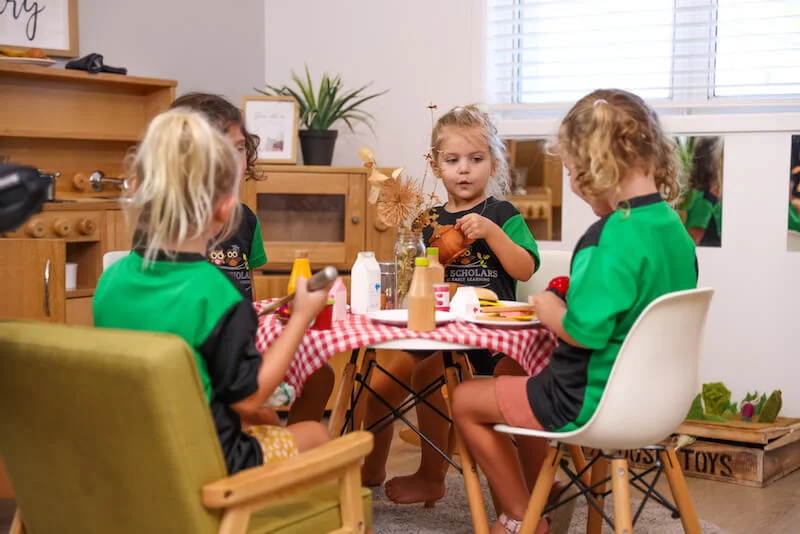
Australia’s Early Years Learning Framework (EYLF) was designed to ensure that a consistent standard of early childcare education is provided to all children aged 0 – 5 years. The framework works as a guideline for early childhood educators to use when building out their programs and activities.
Early childhood educators who follow the EYLF are able to provide high-quality, play-based learning experiences to promote children’s physical, emotional, and cognitive development, and help them to become confident, resilient, and engaged learners.
The framework is built on a series of key pillars, principles, practices, and learning outcomes.
The three key pillars of the EYLF are Belonging, Being, and Becoming.
There are five principles in the framework that guide educators in providing high-quality, play-based learning experiences for young children.
There are several EYLF practices that guide educators in providing high-quality, play-based learning experiences for young children, and they are:
The EYLF outlines five learning outcomes that guide educators in promoting the social, emotional, and cognitive development of young children. These outcomes are:
The Early Years Learning Framework (EYLF) provides a solid foundation for high-quality, play-based learning experiences for young children.
At Little Scholars, we follow the EYLF principles, practices, and learning outcomes to create a fun and engaging learning environment that promotes children’s overall development and well-being. We’re committed to ongoing learning and reflection to continually improve our teaching practices and provide the best possible learning experiences for young children. If you’re in need of care for your little ones in South East Queensland, book a tour today.
At Little Scholars, the Early Childhood Australia Code of Ethics serves as one of our guideposts in our approach to education, informing our interactions with children, families, colleagues, and the wider community. Our dedicated educators embrace these ethical standards, continually striving to provide a caring, inclusive, and stimulating environment for every child in our care.
At Little Scholars, we are committed to providing a nurturing and enriching environment for your child. Book a personalised tour of one of our campuses today. We look forward to welcoming you and your child to our community.
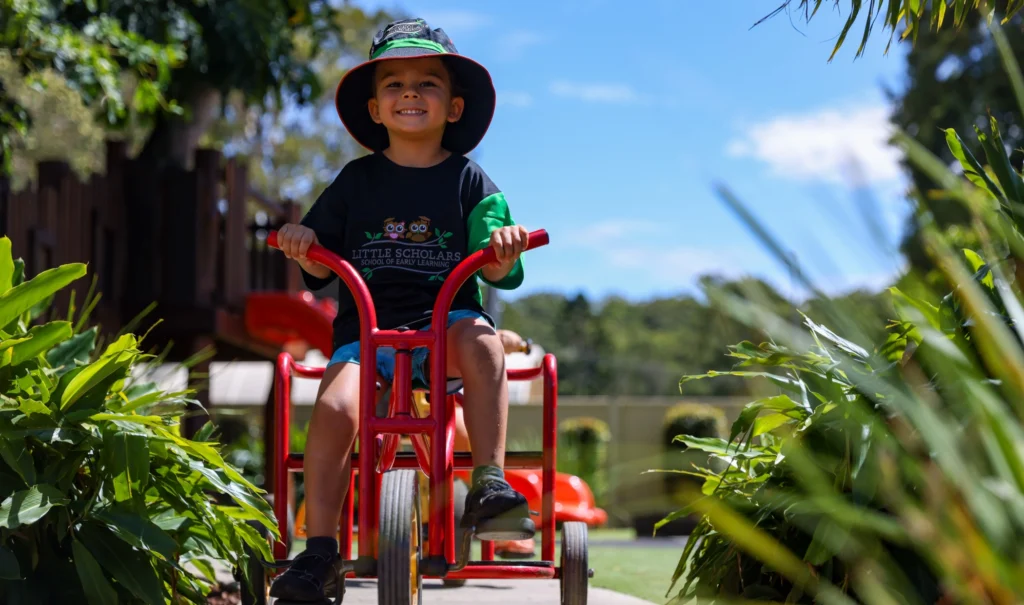
The ECA Code of Ethics is a set of guiding principles designed to help early childhood professionals navigate the complex decision-making processes involved in their work. It is a living document developed by Early Childhood Australia, the country’s leading advocacy organisation for children’s rights and quality education.
The importance of the ECA Code of Ethics in early childhood education cannot be overstated. It serves to inform and guide educators about their ethical responsibilities, promoting integrity and professionalism. By committing to the Code, educators reaffirm their responsibility to children’s well-being, learning, and rights, thereby cultivating environments that are nurturing, inclusive, and respectful.
The ECA Code of Ethics also offers a common language for discussing ethical issues and dilemmas that may arise in early childhood settings. It supports educators in making decisions that align with core ethical values, fostering trust and collaboration among colleagues, families, and communities.
At Little Scholars, we wholeheartedly embrace the ECA Code of Ethics, using it as a compass in our daily practices and interactions. Our commitment to these principles reflects our dedication to providing the highest quality early learning on the Gold Coast.
The ECA Code of Ethics rests on deeply held values. These values are central to the profession of early childhood education and direct decision-making processes concerning ethical responsibilities. These values accentuate respect and uphold the rights and dignity of all – children, families, colleagues, and communities. The ECA Code of Ethics principles are based on the United Nations Convention on the Rights of the Child, an international agreement on childhood developed in 1991.
One of the core principles emphasises the uniqueness of each child. This principle recognises that every child, with their individual interests and strengths, has the potential to contribute significantly to their communities.
It is acknowledged that children, from birth, are full-fledged citizens, deserving of civil, cultural, linguistic, social, and economic rights. This principle emphasises that children are not merely passive recipients but active participants in society.
Effective learning and teaching is seen as a professional undertaking that utilises specialised knowledge and incorporates diverse perspectives. This principle values informed decision-making in shaping learning environments and experiences.
The Code of Ethics also underscores the importance of partnerships with families and communities. These partnerships foster shared responsibility and collective effort in promoting children’s learning, development, and wellbeing.
Promoting democratic, fair, and inclusive practices is another core principle of the ECA Code of Ethics. It recognises the importance of equity and cultivates a strong sense of belonging among all participants.
At the heart of children’s education and care are respectful, responsive, and reciprocal relationships. This principle promotes a relationship-centred approach in all interactions involving children.
The importance of play and leisure in children’s learning, development, and wellbeing is also a key principle. This reflects the understanding that children’s engagement in play is not only natural but also essential for their holistic development.
Lastly, the Code of Ethics recognises that research, inquiry, and practice-based evidence are integral in informing quality education and care. This principle encourages a culture of continuous learning and evidence-based practice.
The ECA Code of Ethics outlines several significant commitments that educators make as they undertake their crucial role in the field of early childhood education. These commitments form the ethical backbone of the profession, providing guidance and norms to ensure the best possible care and education for all children.
Foremost in the Code of Ethics, educators pledge to act in the best interests of all children. They commit to creating safe, inclusive, and stimulating learning environments that respect children’s agency, balance child-led and educator-initiated experiences, and value the role of play in learning and development.
Educators also commit to maintaining strong, respectful, and cooperative relationships with families, recognising the vital role that family plays in a child’s life and learning. They promise to treat all families with respect, regardless of their composition, circumstances, or cultural background.
The Code encourages educators to cultivate supportive and respectful relationships with their professional peers. They commit to collaborate, share knowledge, and provide support to enhance the quality of care and education provided.
A pledge to uphold the reputation and standards of the early childhood education profession is also central to the Code of Ethics. Educators commit to engaging in continuous professional learning, and upholding ethical standards and policies in their practice.
Finally, the Code recognises educators’ role within larger communities and societies. They commit to promote the value of early childhood education, advocate for the rights and wellbeing of all children, and act as stewards of the environment for current and future generations.
For further information regarding the educators commitments outlined in the ECA Code of Ethics, visit the ECA website.
At Little Scholars we are dedicated to creating a nurturing, stimulating, and safe educational setting for children. To accomplish this, we have integrated the Reggio Emilia approach into our curriculum. This powerful educational philosophy puts the child at the heart of their learning journey, aligning perfectly with our commitment to compassion, love, and preparing children for life.
This article explores what the Reggio Emilia approach is, how it originated, and how we integrate it into our teaching at Little Scholars.
Little Scholars provides an attractive and safe environment to children on the Gold Coast while giving you total peace of mind while your children are in our care. Learning areas include well-equipped playrooms and landscaped outdoor spaces for maximum learning opportunities. Book a tour today if you are looking for a childcare centre in SE Queensland.
The Reggio Emilia approach is an educational philosophy focused on early childhood education. Originating from the region of Reggio Emilia in Italy, this approach views young children as curious individuals who have the potential to learn from everything around them.
Essentially, the Reggio Emilia approach places significant emphasis on fostering a strong sense of self, creativity, and cognitive skills through a systematic learning process based on exploration and discovery. It recognises children as active participants in their learning, with their own unique interests, abilities, and the capability to construct their own understanding and knowledge of the world.
There are 11 key principles in the Reggio Emilia approach:
The Reggio Emilia approach to early childhood education originated after World War II, through collaboration between early childhood educator and psychologist Loris Malaguzzi and parents in the villages surrounding Reggio Emilia, Italy. They joined forces to create a new type of childcare education that would prioritise community involvement, instil a love for learning, and promote respect. Together, they established and managed preschools that emphasised the significance of community, democracy, and an active role in education. This shared mindset laid the foundation for what we now know as the Reggio Emilia approach.
Over time, the Reggio Emilia approach has evolved, incorporating influences from various sociological and academic ideas. Despite its humble beginnings, this philosophy has gained international recognition for its innovative and child-centred approach, making a profound impact on early childhood education. Today, thousands of schools inspired by the Reggio Emilia approach can be found worldwide, each adapting and implementing the philosophy in ways that resonate with their own specific cultural and community contexts.
In a world where traditional education can often be rigid and structured, the Reggio Emilia approach offers a refreshing child-centred approach, recognising and valuing children as strong, capable, and resilient individuals who possess innate wonder and knowledge.
At Little Scholars, we embrace the Reggio Emilia approach as it aligns with our philosophy.
We integrate this philosophy alongside Australia’s National Quality Standard for education and the Early Years Learning Framework, into our everyday practices, curriculum, and interactions. Our aim is to create environments that inspire children’s exploration, discovery, and active engagement. In our studios, we purposefully arrange the space to stimulate curiosity, problem-solving skills, and social interaction. Every nook and cranny of our campuses are designed to be a learning space where children can interact with materials, nature, and their peers.
The unique combination of our values and the Reggio Emilia approach not only nurtures cognitive and social skills but also fosters deeper growth. It equips children with a strong moral compass and a deeper understanding and respect for the world they live in.
Since nearly the beginning of Little Scholars, Little Scholars School of Early Learning has been proud to have special friendships in the community with people who live in aged care setting.
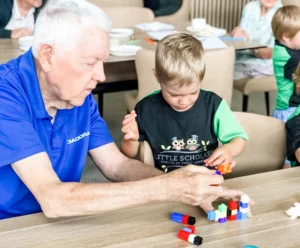
The premise of Little Scholars Intergenerational Program, dating back to 2015, is simple. It’s all about supporting connection between the young and the young at heart and bringing parts of our community together.
“It all began when our leadership team attended an intergenerational forum where we learnt that 16% of people in Australia are over 65 years of age and 45% of these people have reported feelings of loneliness. That’s a huge number and made us want to act,” says Jae Fraser, founder of Little Scholars.
“We also had some feedback from families who had moved here from interstate or internationally, and their children had no physical contact with their grandparents – so this was a wonderful opportunity for us to allow these children to have ‘Grandfriends’.”
Isolation and feelings of loneliness are a serious threat for older people, because they’re more likely to live alone, lose family members and friends, suffer from chronic illness and hearing loss. Statistically, one in four older (over 65) Australians live alone.* Of those who live alone, according to a 2015 Australian Bureau of Statistics survey, about 12% didn’t receive visitors in a three-month period, and older men were reported to be less likely to have been visited, at 17%.
In a 2020 Royal Commission report, of the Australians who reported knowing someone in aged care facilities, one third never contacted the people they know, and one in five never visited.
Social isolation has also been linked to mental illness, emotional distress, suicide, the development of dementia, premature death, physical inactivity, poor sleep, and biological effects, including high blood pressure and poorer immune function.
Little Scholars aims to fix this.
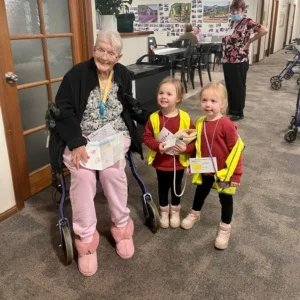
With our intergenerational program, the children visit with their grandfriends fortnightly. They do crafts, play games, sing songs, share morning teas and have meaningful chats. For their young-at-heart mates, the visits help alleviate challenges of isolation, and brings joy, feelings of self-worth, developing new friendships, silliness, and fun. For the children, the visits have a multitude of benefits, including:
So many of the residents just want or need one thing that they can look forward to, to keep them going.
Natalie Carey, Deception Bay campus manager
Our Redland Bay campus started its friendship with a nearby aged care home because a parent worked there. The parent mentioned how much the residents loved when her own children visited, so staff decided to reach out and begin planning an intergenerational program.
“We started with just the kindergarten class, and every time we went down there, we took a different age group with us,” says Jordie, now campus manager of Little Scholars Ormeau 2. “We went there to share high teas, we created hampers for the residents for Mother’s Day, Father’s Day and Christmas that were donated by our families.”
Our Deception Bay Little Scholars began its program in 2016, when campus manager Nat arranged for the kindergarten children to visit the aged care home Nat’s grandmother lived in.
“We connected with them to be able to give the elderly someone consistent who would come and visit them, as some of them received no visitors,” Nat says. “I learnt this when I spoke to one of my grandma’s carers and she said so many of the residents just want or need one thing that they can look forward to, to keep them going.”
Nat says they started taking the kindergarten children regularly, then extended it down to the younger studios to embed it across their service.
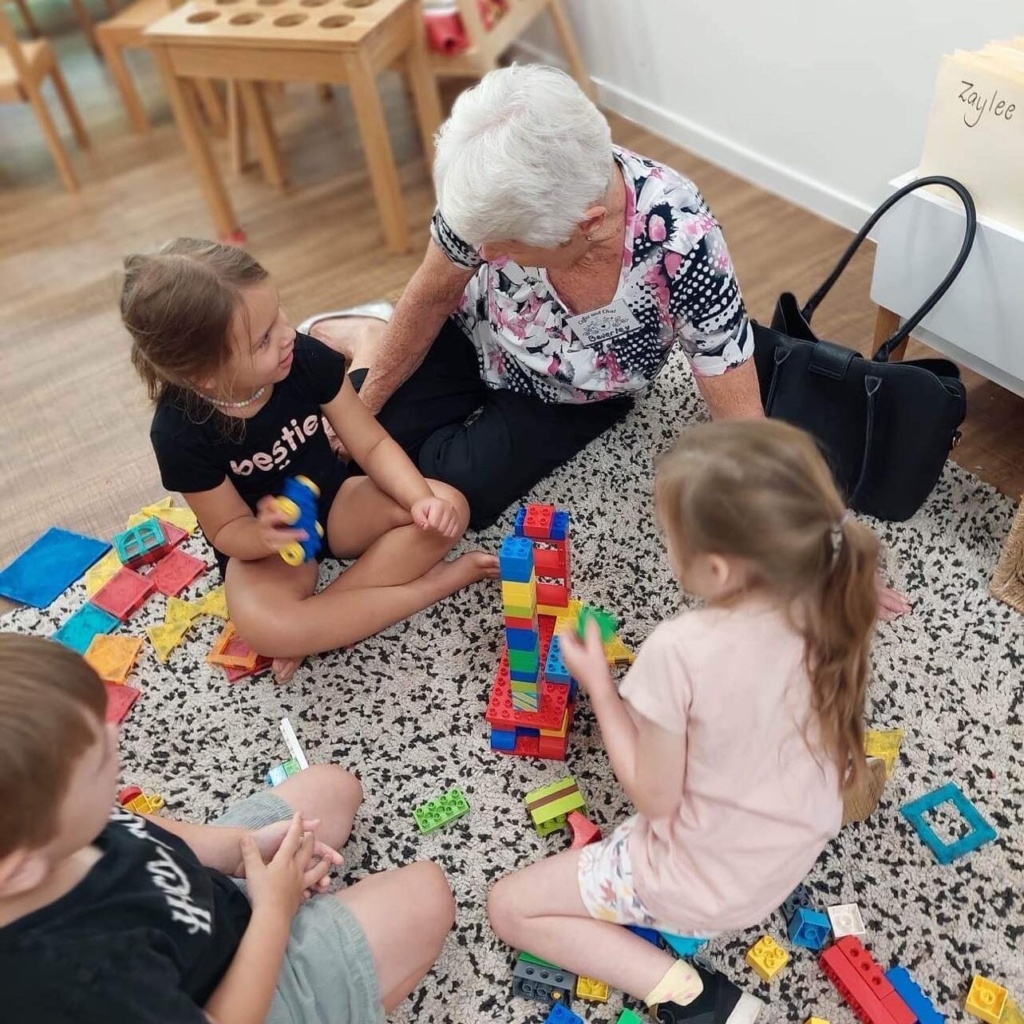
“We would always take five or six kindergarten children to allow the connections to continue between the children and their grandfriends. The dementia patients, in particular would love our babies, and together we got to create and witness some special moments.”
The Little Scholars Ashmore campus started its intergenerational program last year, after working with Griffith University’s Dr Jennifer Cartmel and PhD student, Jelisa Tan.
Jelisa did her placement at the campus and prepared resources for team members and families. She shared slideshows, floor books and fact sheets with an emphasis on the benefits of the intergenerational program and its progress.
While many of our services have had informal relationships with local aged care residences for many years, we believe the intergenerational program is more important than ever and will be incorporated in all 13 Little Scholars campuses by the end of 2023.
“Celebrating the role older community members play in the development of children is something to be fostered and celebrated. The program is one of the most popular aspects of our services, we’ve found our community loves finding occasions to see the different generations come together and share in a common experience,” Jae says.
Help your child grow physically, emotionally, socially. Our intergenerational program will be at all our campuses by end of 2023. Learn more about Little Scholars.
Related stories
Are you a local looking for some new children’s activities on the Gold Coast, or here on holiday trying to plan some outings? We can help!
Apart from the beautiful beaches to explore, playgrounds to climb, and the hinterland to hike in, there are plenty of other entertaining and engaging activities for your little ones on the Gold Coast. At Little Scholars, we understand that finding a variety of fun, safe, and educational experiences is vital for your child’s growth and development.
Let us guide you on a journey through some of the Gold Coast’s top spots for family fun.
A visit to the Gold Coast is incomplete without exploring its fantastic wildlife offerings. Each of these wildlife spots provides an opportunity for your children to connect with nature and learn about the importance of protecting our environment.
The David Fleay Wildlife Park is a wonderful place for your little ones to meet cuddly koalas, hopping kangaroos, and other unique Queensland animals in their cosy homes. You can become a member and get special access to an Animal Care training program at David Fleay’s Wildlife Park while helping David Flea’s dream alive.
Visit Paradise Country, an authentic Aussie farm experience where children can feed kangaroos, snuggle with koalas, and see a range of farmyard friends.
Just beyond the Gold Coast in Northern NSW, Tropical Fruit World is a colourful and tasty adventure where children can go on a tractor ride to taste and discover exotic fruits, learn fun facts, and enjoy exciting farm games.
The Currumbin Wildlife Sanctuary is a magical place where children can see and learn about Australia’s unique animals, feed kangaroos, learn how animals are looked after in the Currumbin Wildlife hospital, hold koalas, and watch amazing bird shows.
This National Park is a great place for little explorers to follow trails, look at colourful birds and butterflies, and learn about the Gold Coast’s wonderful nature and Indigenous history. Make sure to stop by the Jellurgal Aboriginal Cultural Centre while you’re there!
Fun-filled and bustling with excitement, theme parks offer a range of interactive and entertaining experiences for the whole family that promote learning through play.
A dream-come-true for movie-loving children! Warner Bros. Movie World offers thrilling rides, amazing shows, and chances to meet beloved film characters.
Visit Sea World, an underwater adventure where children can touch dolphins, watch entertaining shows, and enjoy exciting rides.
The Gold Coast offers plenty of indoor fun for days when outdoor activities are less appealing. Whether it’s a rainy day or you’re seeking a break from the sun, these indoor activities allow for a fun-filled time.
Timezone is a fun-filled zone full of arcade games, easy bowling, and many more indoor delights that your children will love.
Stepping into a world reminiscent of an old school New York hotel, the Hijinx Hotel interactive gaming adventure offers a blend of nostalgia and innovation perfect for older children (with a minimum age of 5). In a series of themed Challenge Rooms, teams of 2 – 6 face various collaborative puzzles, from navigating adult-sized ball pits to engaging in supersized scrabble challenges.
For families with a sense of adventure, the Gold Coast does not disappoint. As we guide our children towards bravery and resilience, trying out some of these adventurous activities can be a stepping stone towards their personal growth.
Fun and safe surf lessons that introduce children to the joy of surfing, under the watchful eye of professional instructors. You can find surf lessons all across the beaches of the Gold Coast, so keep an eye out for one near you!
Hopefully this list has given you some ideas on how to keep your children busy with fun and enriching activities on the Gold Coast, whether you live here or are just visiting. Each adventure, be it observing wildlife, venturing into a theme park, or participating in unique and educational activities, will contribute to your child’s development and growth. After all, every moment is an opportunity to learn, play, and create beautiful memories!
If you’re looking for a childcare centre on the Gold Coast, contact us today!
In today’s fast-paced world, science, technology, engineering, and mathematics (STEM) are the driving forces behind innovation and progress. To equip the next generation with the skills they need to thrive in this exciting landscape, we have to recognise the incredible impact of early childhood education. A recent study conducted by researchers at the University of California Irvine has revealed the transformative power of high-quality early childhood education and care (ECEC) in nurturing children’s STEM achievements throughout their educational journey.
The study’s findings are both exhilarating and promising. They show that children who have access to top-notch ECEC before starting school are more likely to excel in STEM subjects as they progress into high school. This underscores the vital role of investing in early education and providing children with the necessary tools and support to build a strong educational foundation.
The researchers identified two key factors that contribute to the success of early childhood education in fostering STEM abilities. Firstly, igniting children’s curiosity through cognitive stimulation has a profound impact on their problem-solving skills and overall STEM performance. Early childhood educators who create engaging learning environments and incorporate hands-on experiences play a pivotal role in nurturing children’s passion for STEM. Secondly, the study emphasised the crucial role of educator sensitivity and responsiveness. When educators demonstrate empathy, attentiveness, and genuine care for children’s needs, it not only supports their overall development but also significantly influences their STEM achievements. The emotional connection established during these early years lays the foundation for children’s social-emotional skills, which are closely intertwined with cognitive development.
Interestingly, the study also revealed that sensitive and responsive caregiving in early childhood has an even greater impact on STEM performance for children from low-income families compared to their peers from higher-income backgrounds. This finding highlights the importance of addressing equity in early education and ensuring that all children, regardless of their socioeconomic status, have equal access to high-quality early learning that fosters STEM engagement. Speaking of STEM, did you know that Little Scholars offers an exciting STEM program for our kindergarten children? In collaboration with our friends at Lab Kids, we provide an incredible educational STEM program that aligns with the Early Years Learning Framework and the Australian National Curriculum. From exploring motion and states of matter to learning about light, sound, and chemical reactions, our curious little scholars embark on an exciting journey of STEM discovery!
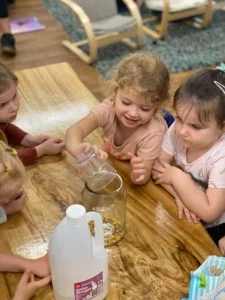
Finally, the University of California Irvine study reinforces the immense value of early childhood education in nurturing STEM success. By providing high-quality early learning that fosters curiosity, responsive caregiving, and an inclusive learning environment, we begin to realise the full potential of our Little Scholars. Book a tour at Little Scholars.
If you follow our social media posts, you know we’re passionate about getting our Little Scholars outside. Have you ever wondered why outdoor play is such a vital part of our early educational program?
Imagine the fresh air brushing against your face, the satisfying crunch of leaves under your feet, or the soothing sound of a nearby burbling stream. Picture the invigorating scent of freshly cut grass or the refreshing breeze of the salty sea air. Envision the tactile sensation of rough bark or smooth stones. And finally, visualise the breathtaking beauty of greenery, rivers, streams, and oceans.
In essence, being outdoors offers the ultimate sensory experience that simply cannot be replicated in a studio.
Many of us cherish childhood memories filled with boundless hours spent exploring the great outdoors. However, as life has grown busier for families, children today are spending less time engaging in unrestricted play outside. A recent study by Royal Children’s Hospital national child health poll found that 45% of Australian children play outdoors most days, and 80% of parents would like their children to spend more time outdoors. At Little Scholars, we want children to rediscover the joy of unstructured play in nature.
One study found that children who engage in just one third more outdoor activities than their peers grow up to be happier adults
Outdoor learning should be an integral part of children’s everyday lives, providing fun and enjoyment while also serving as a stimulus and extension of their indoor learning. If your child attends Little Scholars, outdoor play is a key component of their daily experience on our campus.
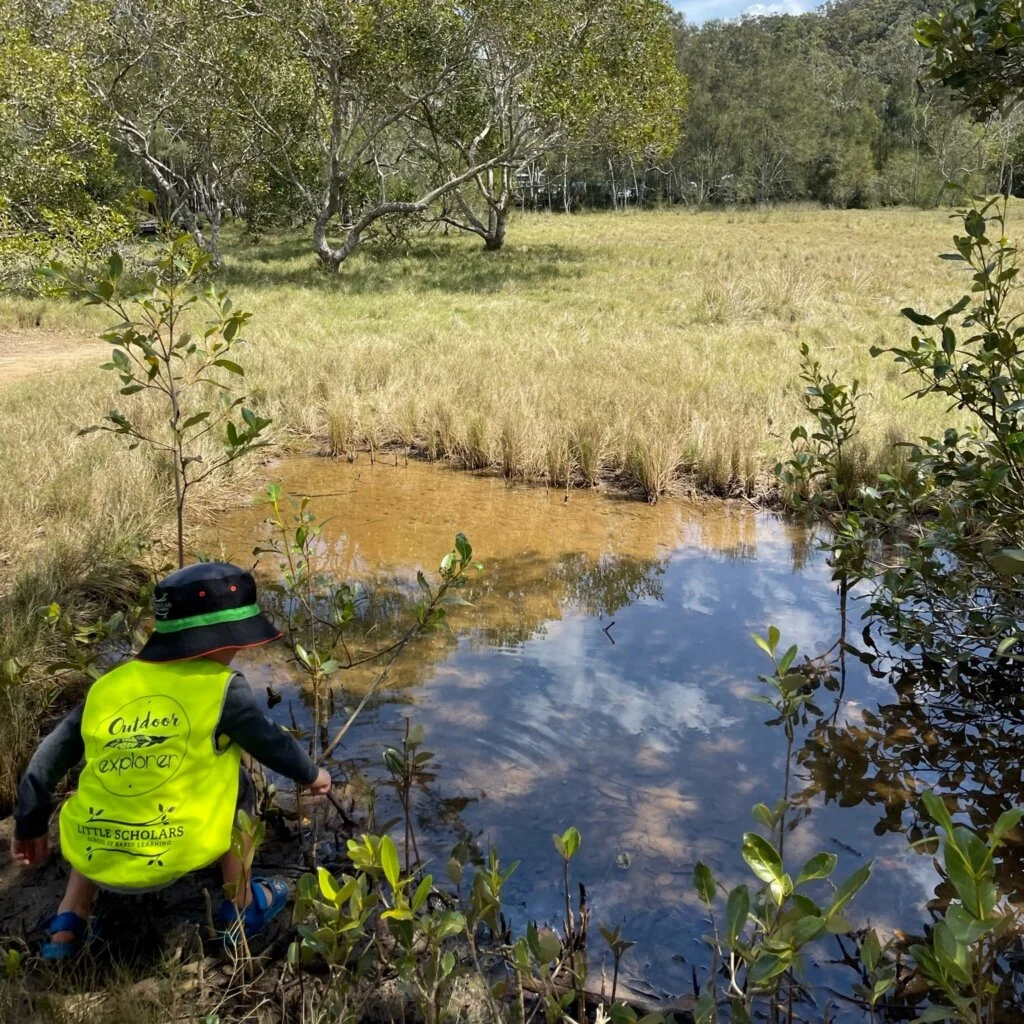
At Little Scholars, our educational programming places a strong emphasis on the natural environment. We have developed the Little Scholars’ Bush Kinder program, an innovative outdoor education experience for children of all ages, fostering exploration, discovery, and learning in nature.
During our Bush Kinder adventures, children engage in a range of activities, including nature walks, wildlife watching, building shelters, and learning about indigenous culture. They climb, scramble, jump, and fully immerse themselves in nature’s playground.
Our outdoor teachers are highly experienced and qualified in outdoor education and child development. They understand the significance of outdoor and nature play in fostering children’s development and well-being. By cultivating a love for nature and the environment, as well as a connection to all living things, they help fulfill children’s basic needs for freedom, adventure, experimentation, risk-taking, and simply being children.
At Little Scholars, the safety and security of our children are of utmost importance. Our Bush Kinder program is conducted in a safe and secure outdoor environment, with strict protocols in place to ensure the well-being of all participants. Our educators are passionate about providing children with meaningful learning experiences in a safe and supportive setting. Extensive risk assessments are conducted prior to excursions, but children are also advised and included in risk assessing while on their adventures so they can begin to think about safe risk taking while enjoying being outside. Our Bush Kinder program is designed to be fun, engaging, and educational, and there are plenty of benefits for children while they’re out on their adventures.
Children have the opportunity to explore and discover the wonders of the natural environment, learning about plants, animals, and ecosystems firsthand.
Through hands-on experiences, children develop critical thinking and problem-solving skills. They learn to navigate challenges and find creative solutions.
Outdoor play provides ample opportunities for children to interact with their peers, fostering the development of social skills and the formation of new friendships.
Engaging in outdoor activities helps children develop their physical skills, such as coordination, balance, and strength.
During bush kinder, we engage in Dadirri, an Aboriginal word meaning ‘inner deep listening and quiet still awareness and waiting’. So while out enjoying nature, the children and educators sit with a bit of space from each other and pay close attention to what they can hear, see, smell and feel. Bush kinder also provides an opportunity to learn, acknowledge, and celebrate the history and traditions of the people who were the traditional owners of the land they love to spend time exploring.
Finally, spending time in nature cultivates a sense of wonder and deepens children’s appreciation for the natural world around them.
While we take pride in our learning programs that prioritise outdoor play, it’s important to acknowledge the foundations upon which these programs were built. Our teams have conducted extensive research and drawn from the following theories:

Friedrich Froebel (1782-1852): Froebel’s approach emphasises holistic development and creativity in early childhood education. He recognised the importance of outdoor learning, nature walks, and gardening.
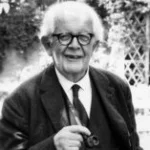
Jean Piaget (1896-1980): Piaget’s theory of cognitive development highlights the role of play in intelligence development. He believed that children’s play and environment should encourage cognitive and language growth.

Lev Vygotsky (1896-1934): Vygotsky emphasised the importance of children’s interaction with the environment and their peers. He believed that learning is enhanced through social interaction and scaffolding from a more knowledgeable other person.
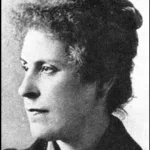
Margaret McMillan (1860-1931): McMillan, along with her sister Rachel, played a pivotal role in nursery education. They advocated for open-air nurseries and opened Britain’s first open-air nursery, and unlimited outdoor play, recognising the benefits of hands-on experience and active learning.
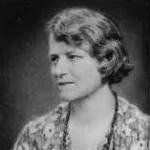
Susan Sutherland Isaacs (1885-1948): Isaacs, an educational psychologist, believed in the central role of play in a child’s education. She emphasised the importance of outdoor exploration and community engagement to support children’s emotional and cognitive needs.
While our Bush Kinder program is a significant aspect of Little Scholars, outdoor play doesn’t always require leaving the campus. Our yards are purposefully designed as extensions of our studios, providing space for learning, relaxation, and play. From play forts to bike tracks, gardens to sensory paths, and water play areas, our outdoor environments offer open and less structured spaces for children to explore, overcome challenges, and grow.
By encouraging children to spend time outdoors, whether through Bush Kinder or within our incredible yards, we aim to provide them with a well-rounded early education. Outdoor play nurtures essential skills such as resilience, teamwork, creativity, mindfulness, and risk assessment in a safe and supervised environment.
Now that you understand why outdoor play is such an integral part of the Little Scholars experience, it’s time to discover how nature play can bring out the best in your child. Find out more by booking a tour and witnessing our commitment to fostering children’s growth and development firsthand.
Because we offer a transition to school program through our kindy and pre-kindy studios, from time to time, our educators and early childhood teachers are asked, ‘when are you going to teach my child to read?’ to which our answer is, we already are! But perhaps, not in the way parents expect.
The expectation from parents sometimes seems to be that your child will finish their time with Little Scholars and walk into prep knowing how to read, but that’s not exactly our aim.
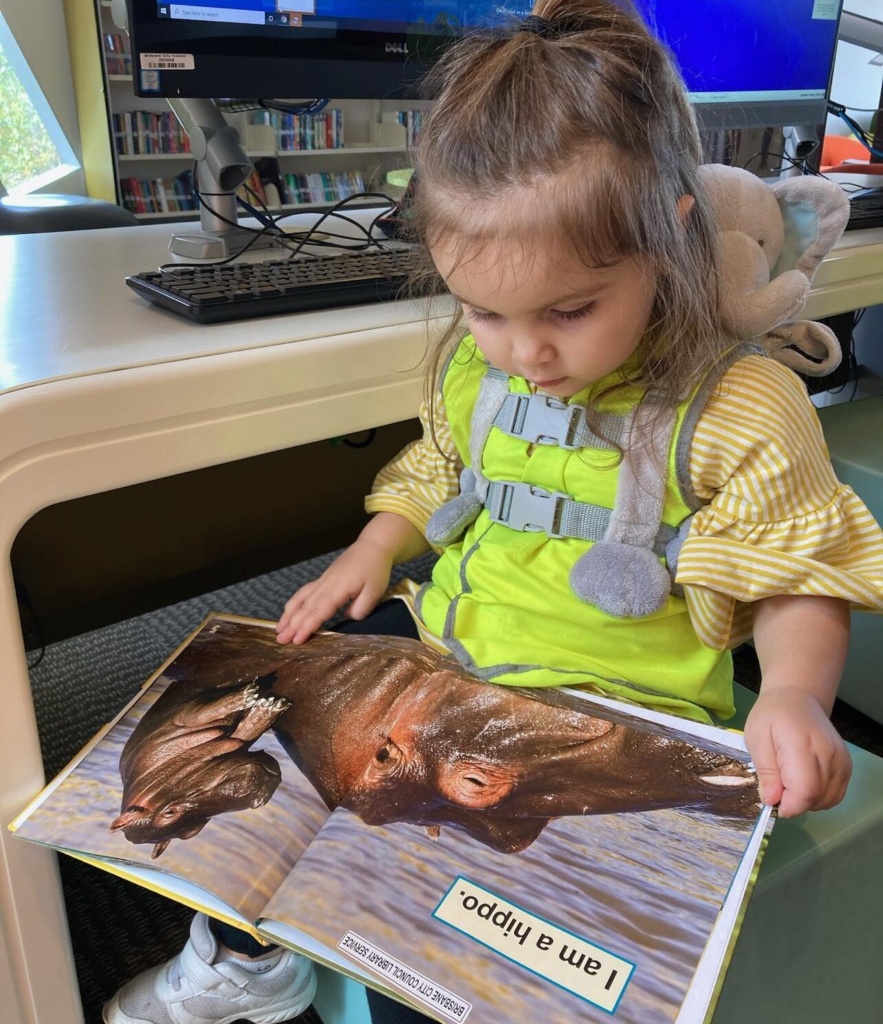
Learning to read really starts from infanthood, and is a big process. In fact, research has found newborns’ brains are prewired to be receptive to seeing words and letters. This means babies are already getting ready to read at birth. The relevant part of the brain, known as the “visual word form area” (VWFA), is connected to the language network of the brain, and was discovered by researchers at Ohio State University, who analysed the brain scans of 40 one-week-old babies, as part of the Developing Human Connectome Project.
Researchers compared these to similar scans from 40 adults who participated in a separate Human Connectome Project. The VWFA is next to another part of visual cortex that processes faces, and it was reasonable to believe that there wasn’t any difference in these parts of the brain in newborns. Because as visual objects, faces have some of the same properties as words do, such as needing high spatial resolution for humans to see them correctly.
But the researchers found that even in newborns, the VWFA was different from the part of the visual cortex that recognises faces, primarily because of that connection to the language processing part of the brain.
Lead researcher Zeynep M. Saygin’s team is now scanning the brains of three and four-year-old children to learn more about what the VWFA does before children learn to read.
Research has also showed babies can differentiate their native language from another language when they’re only hours old, which means they begin processing language in the womb. And, amazingly, studies have also found that at birth, the infant brain can perceive the full set of 800 or so sounds, called phonemes. Phonemes form every word in every language.
People can’t learn to read without understanding language, so your child has been working on learning to read since birth!
We encourage language development in many ways understanding that oral language is a significant aspect of early literacy, educators engage in song, rhyming and make use of picture books, to tell a story. Through our discussions and interactions with the children, and observations watching children play and what they’re interested in, we extend on their interests as part of our educational and intentional approach. So, for example, if educators see two children playing with toy dinosaurs, they may chat with them about why they’re interested. Then, they may have a conversation with the class about who else might be interested in dinosaurs. Based on the conversation, if many of the children are, they may set up sensory experiences, art opportunities and get relevant books on the topic of dinosaurs and read them together.
We also use words visually for many of our activities, even if they aren’t book-related, so that children begin to recognise words and associate them. Our environments place great emphasis to embed literacy print across all play spaces, this supports rich language experiences. Educators model words through children’s play, for example, when a child is engaged in block play, the educator will discuss the activity with them, exposing children to words, such as ‘you are putting a block on the top,’ (or underneath, or on the side.) These elements of language are also known as ‘positional language’ and introduce children to literacy and elements of numeracy at the same time.
At Little Scholars, we have a specific approach to learning to read. It’s called the 3a Abecedarian Approach Australia to reading. This is where children are active in conversational reading.
A long 1970s study in the US was the basis for the now well-adapted approach. The Abecedarian Project was a controlled scientific study of the potential benefits of early childhood education for disadvantaged children. Children born between 1972 and 1977 were randomly assigned as babies to either the early educational intervention group or the control group.
Children in the experimental group received full-time, high-quality educational intervention in an early learning setting from infancy through age
At the age 30 follow-up study, the treated group was more likely to hold a bachelor degree, hold a job, and delay parenthood, among other positive differences from their peers.
The 3a Approach encourages the adult and child to go ‘back and forth’ in conversation. There are three main levels to try – the first level is seeing, then showing, then saying.
Make it a conversation by asking your child to do something and not always following the words in a book.
“Can you see an owl? “Can you say owl?” “Can you show me an owl?”
At Little Scholars, we start with comprehension when looking at books – the thinking and talking about and enjoying the books we read together either in a group or one-on-one. Once children have a connection to books and reading, that’s when we can start teaching the ‘word parts’ of being a reader.
This is also something parents can and should do at home. Working with families is a core part of the Abecedarian approach! Parents are their children’s first educators, so we believe it’s to support families to grow in confidence as their children’s first educator, and reading together daily supports successful young readers. If you’d like to learn more, talk to your children’s educators or your campus manager for more information.
Read more:
At Little Scholars, we have four pillars that underpin everything that we do at Little Scholars – for our children, families, educators, and our community.
As part of our annual awards, we have four awards dedicated to those Little Scholars’ values – learn, grow, inspire and contribute. This year, while our award-winning educators certainly personify all four pillars, but with their unique special skills and achievements, we’ve declared one clear winner for each pillar.
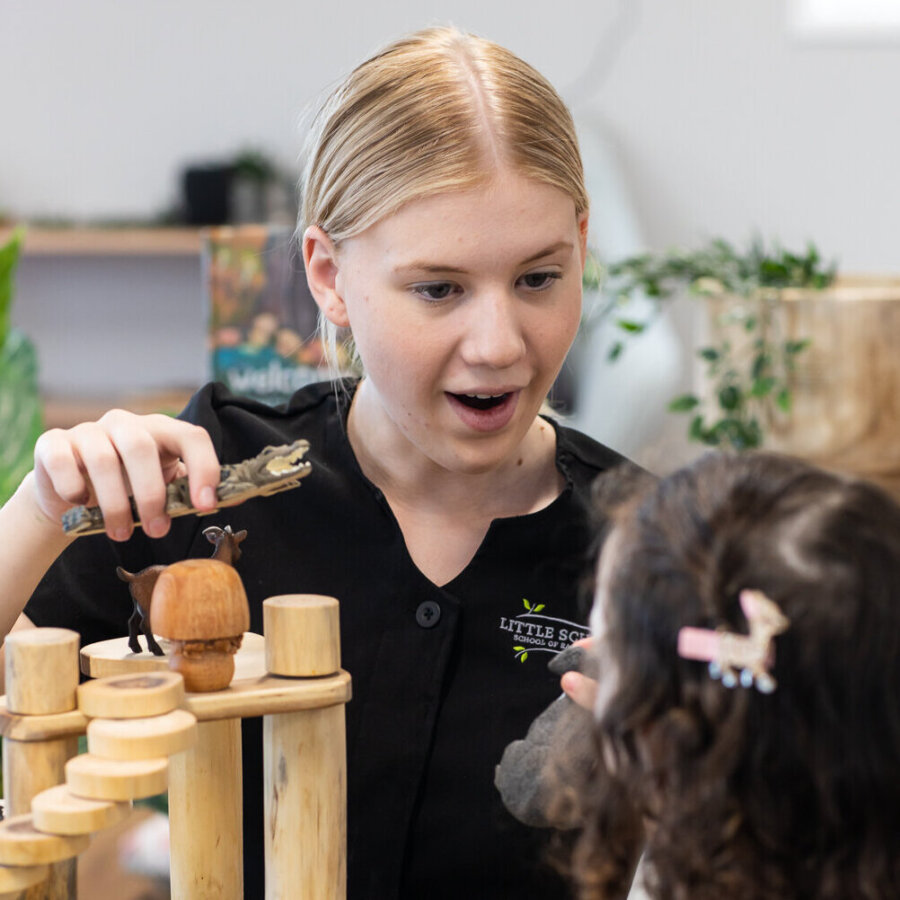
Ellissa at our Ormeau Village campus was named winner of the Pillar Award in the Learn category because she stepped up to become a lead educator, and she is happy to keep learning from her peers and further her education in the sector.
Ellissa is finishing up her studies with her Cert III, then she’ll be moving onto her Graduate Diploma.
From her submission: Ellissa has stepped up into her Lead role during last year and we have watched her grow from assistant to well-deserved Lead and take charge in her space, leading her colleagues while taking feedback on board and striving to excel.
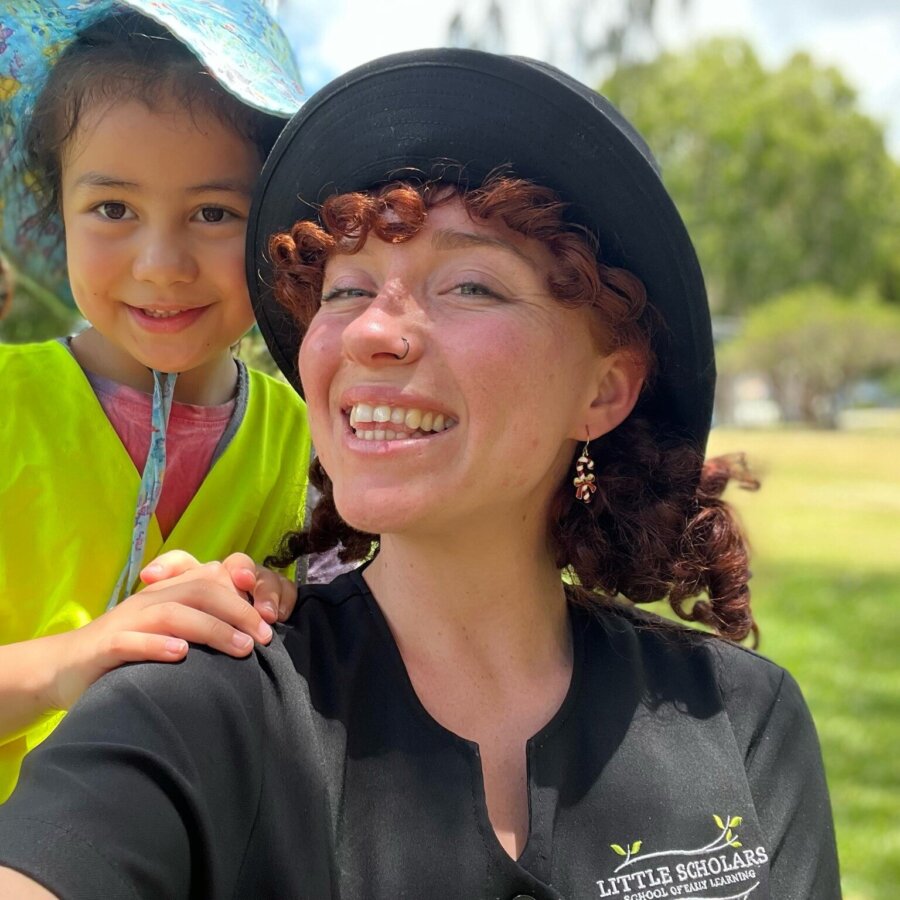
Ella’s experience as a parent with a child at Little Scholars was actually the reason she became an educator herself! Ella is the recipient of an Inspire Little Scholars Pillar Award 2023.
Ella’s nomination
Ella is an educator with the Little Scholars Deception Bay campus, which recently was assessed Exceeding under the National Quality Framework for Early Childhood Education and Care.
In Ella’s nomination to us, it said, “Ella is an inspiration for all in the Deception Bay community. We had some outstanding feedback from the department through our assessment and rating process. Before the process even started, the assessor had mentioned the passion and authenticity observed in Ella’s interactions with our children, families and community. In the assessor’s words – ‘she could sit and watch Ella all day long.’ From one of Ella’s colleagues, ‘the educator she is, is who I aspire to be in my future teaching career. She is strong, but also so caring to each individual child.’
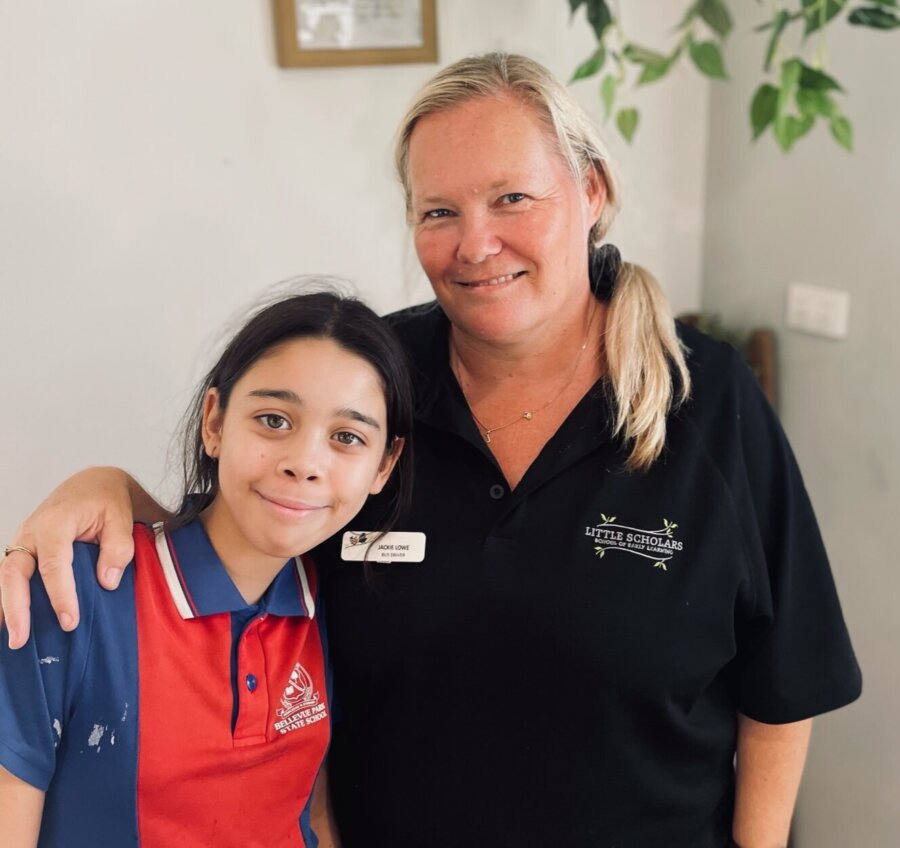
Jackie is an educator at Little Scholars Ashmore campus. In her first year working for us, she was nominated for a Pillar award!
Jackie’s nomination
Campus manager Elise said, ‘Jackie is our jack of all trades! Jackie fits many hats at our campus. From driving the bus to being in the studios to going on vacation care, she wears her many hats with a smile on her face. Her bubbly nature and willingness to help the team wherever needed is admirable. We appreciate her dedication and consistent contribution to the campus.
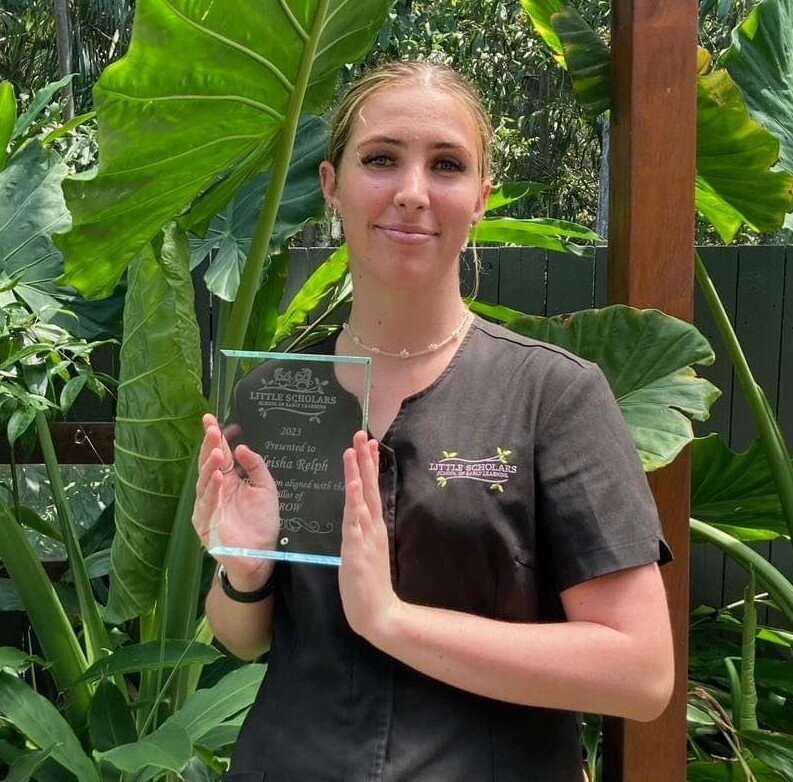
Aleisha has remarkable attributes and we’re told her growth as an educator has been propelled by her enthusiasm to contribute, learn and inspire her team and go above and beyond not only for children, but families as well.
I have been an educator since the end of January 2020. Prior to this, I was a trainee at Little Scholars Nerang since September of 2018 studying my Diploma.
Aleisha’s nomination
Aleisha at our Nerang campus was named winner of the Pillar Award in the Grow category because she’s grown from a trainee at the campus just a few years ago to now full time lead educator, her gentle touch, her willingness to inspire and help others, she was a clear choice for campus manager Renee.
Aleisha is no stranger to accolades, she won Educator of the Year – Peer Choice twice previously. Little Scholars was her first employer in her early childhood education career!
At Little Scholars School of Early Learning, we’re dedicated to shaping bright futures and instilling a lifelong passion for learning. With our strategically located childcare centres in Brisbane and the Gold Coast, we provide tailored educational experiences designed to foster your child’s holistic development.
Let us hold your hand and help looking for a child care centre. Leave your details with us and we’ll be in contact to arrange a time for a ‘Campus Tour’ and we will answer any questions you might have!
"*" indicates required fields